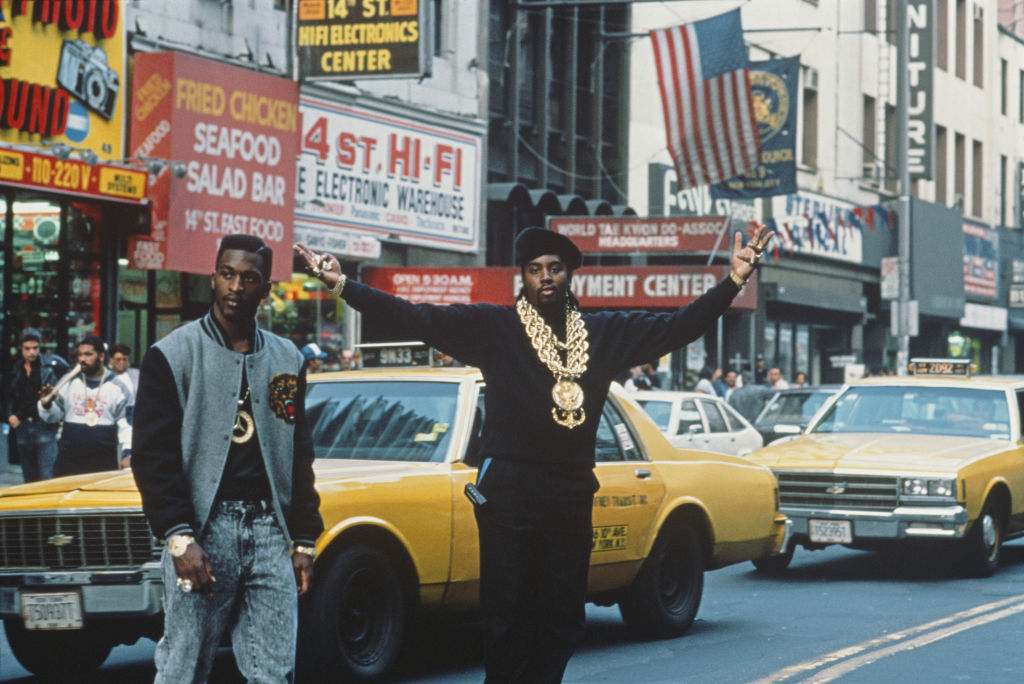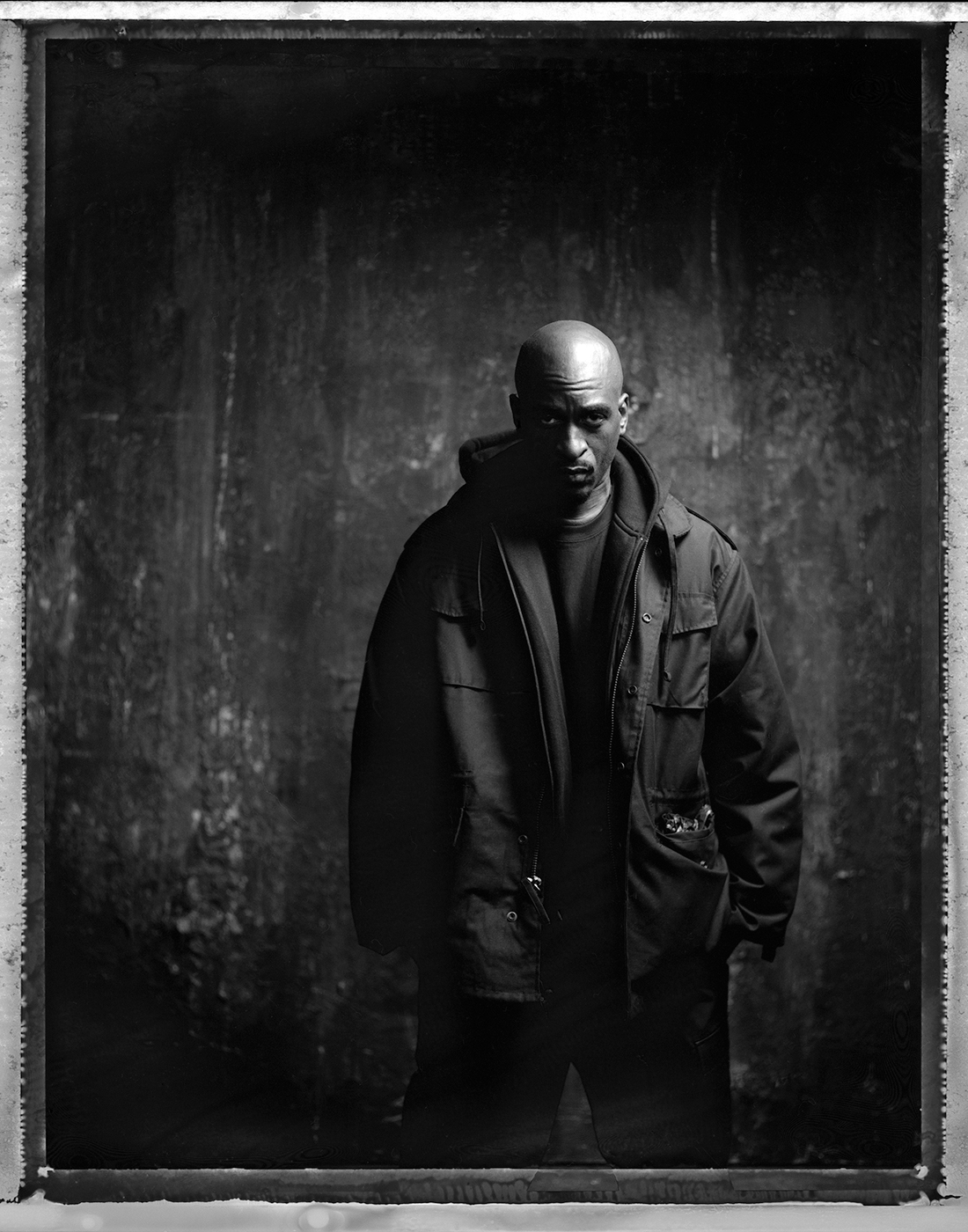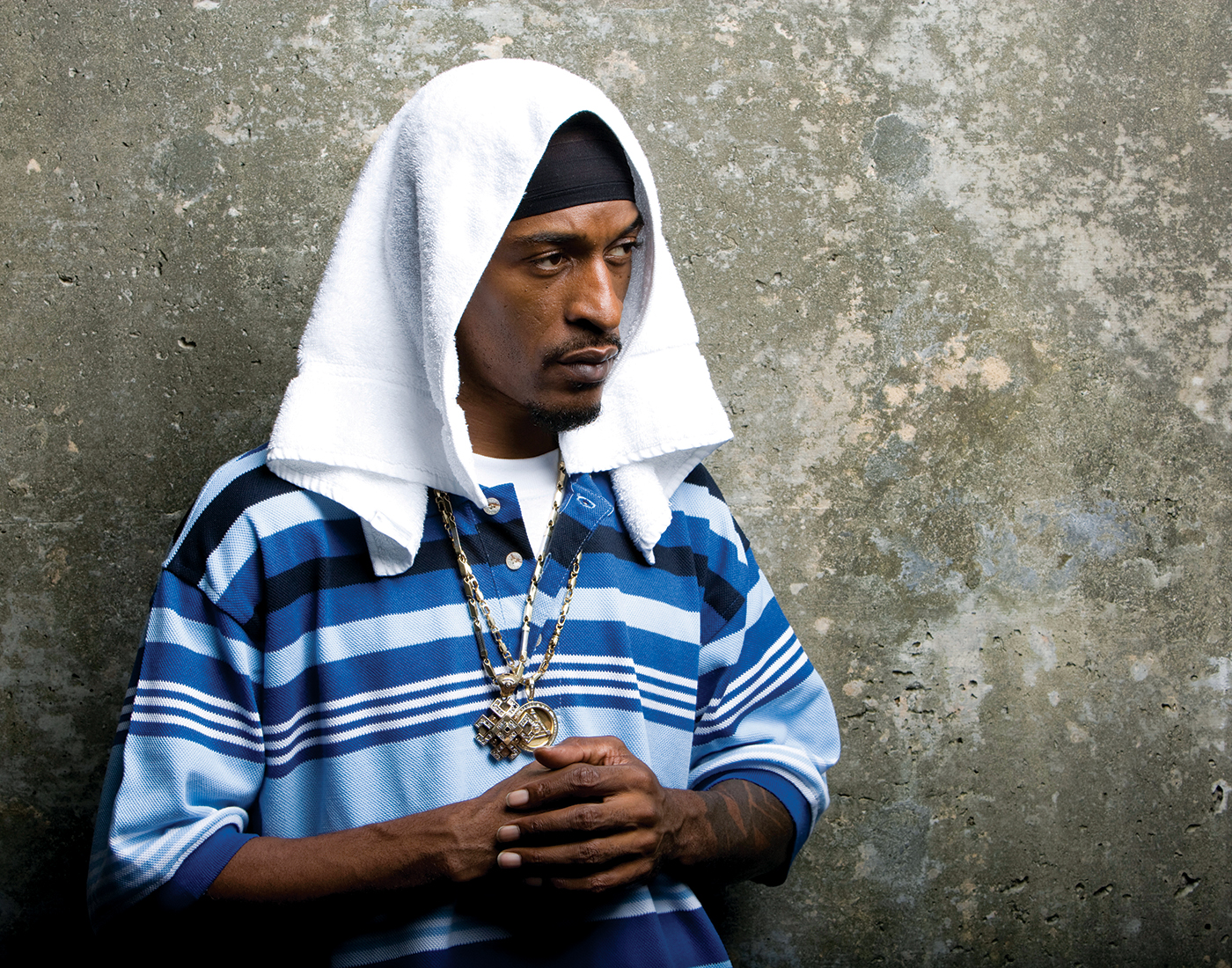Rakim Allah, legendary as half of Eric B. & Rakim, was born William Michael Griffin Jr. on Long Island, New York. As a student at Wyandanch High School he occasionally skipped class, and one day his English teacher, Miss Bonaparte, spotted him in the hallway, tapped him on the shoulder, and asked, “You’re a rapper, right?” Stunned, he hesitantly answered, “Uh, yeah.” She replied, “Well, you’re supposed to be in my class,” and walked away.
Rakim was dumbfounded.
“The whole rest of the period, I was walking around in slow motion, like, ‘Wow, she’s 100% right,’” he tells me. “After that, I never missed an English class unless I was sick. I went in there and robbed that class for every word, every phrase, anything I could get out of that class.”
His household overflowed with music—his father was a collector of jazz and R&B records, while his mother sang everything from jazz to opera. “She even sang at The Apollo on amateur night,” he proudly notes. And he’s related to Ruth Brown, nicknamed the “Queen of R&B,” who was inducted into the Rock & Roll Hall of Fame in 1993.
Both Rakim and his older brother Steve Griffin played the saxophone. Listening to John Coltrane’s 1961 album My Favorite Things as a teen changed Rakim’s life.
“This was a record we played at least once a day, and we’d been listening to it for two weeks,” he says. “I dropped the needle, we listenin’ to it and hear two notes played at the same time. We look at each other, and I’m like, ‘Yo, did you hear that?’ And he was like, ‘Play it again,’ so we played it again. Me and my brother almost ran out the house [Laughs]. We both play the sax, and we knew that was impossible. We didn’t know what to do. But me, everything I see, I convert into music theory, vocabulary, and rhythms.
“So I’m saying to myself, ‘How could I use that as inspiration?’ This man just played two notes at one time. I can’t say two words at one time. Just the fact that he was able to do that let me know that there’s always another level.”
As hip-hop blossomed in the Bronx in the late ‘70s and early ‘80s, Rakim became enthralled with the emerging subculture. He penned his first rhyme in 1976 at the age of 7 about Mickey Mouse. After being introduced to Eric B. via local promoter Alvin Toney in 1985, Rakim—then known as Kid Wizard—soon made his first recordings live at his high school. Full of Coltrane courage, Rakim began experimenting with different techniques and patterns.
At the time, many future hip-hop icons were executing their verses in a simplified, nursery rhyme style. But Rakim, believing anything was possible, tapped into his love of jazz to come up with a free-rhythm style that ignored bar lines and permanently expanded rap’s perceived boundaries.
“Jazz is really what gave me the understanding of time and space,” he explains. “I remember listening to jazz and trying to get the timing. R&B and everything else is in 4/4 time, mostly. But jazz was always a different time.
“I would listen and be like, ‘Yo, where’s the one?’ And one of my favorite joints and what helped me understand, was ‘Take Five’ by Dave Brubeck, 5/8 timing. I’m sitting there like, ‘What the…’ So it was one, two, three, four, five. It just helped me write rhymes in a different way.”


Rakim’s smooth yet unconventional delivery paired with Eric B.’s deep-rooted love of soul, funk, and R&B samples led to him flowing effortlessly over records like Fonda Rae’s 1982 single “Over Like a Fat Rat” and Kool & the Gang’s 1969 hit “Give It Up.” Inspired by “Fat Rat,” Eric B. & Rakim dropped their first single, “Eric B. Is President,” with production help from local beat magician Marley Marl.
Eric B. told spin.com in February 2024, “We were listening to records like James Brown’s ‘Funky President (People It’s Bad).’ I said we needed to get a bass line, something like Fonda Rae’s ‘Over Like a Fat Rat.’ Rakim was drinking a beer, and he spit it all over the wall. He thought it was so funny. He was like, ‘Eric, who the hell is going to take a bass line and put it over this thing?’ So this is what I said—I’ll never forget—I said, ‘I want you to laugh like that when we get paid in full.’”
It wasn’t long before they were. Their debut album, Paid in Full, arrived with a resounding boom in 1987, anchored by the title track and “Eric B. Is President.” Three more albums followed with varying levels of success: Follow the Leader (1988), Let the Rhythm Hit ‘Em (1990), and Don’t Sweat the Technique (1992), cementing their status as one of the most influential DJ/MC duos in hip-hop history. But tension between them reached a boiling point, and they went their separate ways.
Other than for a brief reunion tour in 2016-2017, the duo has primarily remained in their respective corners. Eric B. went on to star in the TV crime drama Blue Bloods, alongside New Kid on the Block alumni Donnie Wahlberg, while Rakim released three solo albums, culminating with 2009’s The Seventh Seal.
Rakim was reluctant to discuss his relationship with his former partner, saying rather cryptically, “Let’s hope that he comes around and do the right thing.”
For now, Rakim is focused on his new album, G.O.D’s Network (REB7RTH), which formally introduces Rakim the producer. The record, executive produced by Matthew “M80” Markoff, isn’t a Rakim solo album at all. Instead, harnessing jazz and hip-hop, he was able to craft beats for fellow MCs like Kurupt and Wu-Tang Clan member Masta Killa, who appear alongside Rakim on the lead single, “Rebirth (N.M.A.).”
“I basically did all the tracks and most of the DJing, and we have a bunch of features on the album,” he says. “I finally got a chance to show my producer side. My jazz music is heavily represented in what I do. I always like picking very melodic samples. The style of music that I gravitate toward is very rhythmic.
“I don’t like regular-sounding melodies or regular beats, so I think that comes from jazz, that time and space. I like the space to be filled a certain way, so I gravitate to a certain kind of music. And I think it shows with the tracks that I did for the artists. And it’s a dope joint. I get to show that I do beats as well.”
Unbeknownst to even the most ardent Eric B. & Rakim fans, he helped produce a lot of their early material, including Paid in Full and Follow the Leader. “I always did music on all my albums since the first. I would bring Eric a beat that I used to rhyme on at the parties. Sometimes Eric might have a bass line, or the beat might be finished or nearly complete already. But I did a lot on the first album and a lot of production on the second. And as time went on, I did the majority of the production. But I never said nothing. It looked good for the group—Eric do the beats and Ra do the lyrics. At the end of the day, it made me grand.”
The album also gave Rakim the opportunity to play his own instruments and dig for samples that appeal solely to him. He hopes his work on REB7RTH will lead to other opportunities and show his savvy behind the production board.
“People will get a chance to see what I do,” he says. “I always did beats and played a couple of instruments. I can’t really play the guitar, but I play with one finger and get what I need [laughs]. Same thing with the piano.
“It’s looking at hip-hop from a different angle and getting a chance to show how I like hip-hop displayed, so it’s fun. The energy is crazy. Writing rhymes and going into the booth and getting on stage is a feeling you can’t really explain. It’s a little different with the beats. I’m not as caught up in it as when I’m doing rhymes. But it’s basically the same feeling.”
Rakim, now 56, recognizes times have changed and that the hip-hop landscape is no longer the “golden era” it once was. But he has realistic expectations for his music in today’s climate.
“Music is so in the open right now,” he says. “Back then, I had an idea of most of the artists that was out in the United States. Now, there’s so many artists out I can’t keep up. I think now it’s just about doing good music, especially for somebody like myself. I have my own fan base, and my thing is to just try to cater to them because if Rakim would try to make a top song right now, I don’t think it’d sound like Ra. I gotta just make music for the people who look for Rakim.”


More than 35 years after releasing Paid in Full, Eric B. & Rakim were nominated for induction into the Rock & Roll Hall of Fame, for a second time, in February, although they didn’t make the final list of inductees. Eminem and JAY-Z cite Rakim as a major influence, and he’s considered one of the greatest MCs. But he still wonders if navigated his career correctly.
“Eric used to always tell my father—because he knew how much I loved and respected my father—‘Ra don’t do this, Ra don’t do that.’ My pops pulled me to the side one day and said, ‘What’s going on? You don’t like to go to the shows and the studio and this and that?’ I said, ‘Yo, dad, it’s different, man. It’s not like other music. People get tired of you quick, and I want to be around for a long time.’ This is ’86.
“‘If I’m not performing then I’m not going to the show just because it’s the big thing this week,’ so I let them know I’d rather not wear out my welcome mat. My father, knowing music and knowing the business, said, ‘You gotta hit while you hot.’ And I told my pops I thought it was a little different in rap. But in the back of my mind, I would always hear my father, ‘You gotta hit while it’s hot.’
“When I would turn things down and not do certain things, or hear people say it’s hard to see me out anywhere, I would always hear my father saying that. So over time, I would wonder which one would be right. I just hope he’s looking down and saying I did it.”
Odds are, he is.
In 2023, Rakim and Geto Boys founder Scarface each received a $500,000 grant from the Paid in Full Foundation. Founded by Ben and Felicia Horowitz, the non-profit organization is dedicated to music education, encouraging music-making through philanthropic giving and public service programs, and providing financial assistance to musicians.
Their annual Hip Hop Grandmaster Awards took place October 5th at The Aria Resort and Casino in Las Vegas, where grants were also presented to Roxanne Shante, Grandmaster Caz, and Kool Moe Dee.
Rakim says, “We trying to make a statement and show what happens when you’re genuinely a good person and love your music. All these years later, Grandmaster Caz loves hip-hop so much, he’s still informing and inspiring. When I see Caz on the ‘Gram, it let me know, ‘Yo, there’s no age on this.’
“You don’t have to be standing on every stage to love hip-hop.”

